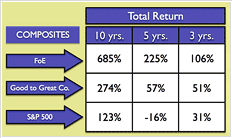A challenge I frequently face while consulting with senior executives and boards of directors of public companies is a belief that their primary mandate is to make profits and enhance shareholder value. Thus, ethical principles like honesty, fairness, and caring are proper guides to decision making only to the extent that they can demonstrably improve profitability or incorporated into laws.
Recently, the Wharton School of Business published a book called Firms of Endearment: How World Class Companies Profit from Passion and Purpose, making the strongest case I’ve seen that good ethics really is good business.
The description on the inside jacket sounds like it comes from new-age, fuzzy-headed anti-capitalists rather than from professors at one of the nation’s most prestigious business schools.
The authors claim, “We’re entering an Age of Transcendence, as people increasingly search for higher meaning in their lives, not just possessions. This is transforming the marketplace, the workplace, the very soul of capitalism. Increasingly, today’s most successful companies are bringing love, joy, authenticity, empathy, and soulfulness into their businesses; they are delivering emotional, experiential, and social value – not just profits.”
What makes this book so important are the cases studies and data that demonstrate that treating customers, employees, suppliers, and the general public extremely well yields extraordinary business results. In other words, good ethics is a great profit strategy.
This is Michael Josephson reminding you that character counts.
______
What is a Firm of Endearment? All companies selected as firms of Endearment (FOEs) by the authors share a common set of core values, policies, and operating attributes which include:
1. Aligning the interests of all stakeholder groups (customers, employees, partners, investors, and society) rather than seeking profit optimization
2. Below-average executive compensation
3. Open-door policies
4. Employee compensation and benefits are above average for their industry
5. Above-average employee training
6. Empower employees to satisfy customers
7. Hire employees who are passionate about the company’s purpose
8. Humanize customer and employee experiences
9. Enjoy below-average marketing costs
10. Honor the spirit as well as the letter of laws
11. Focus on corporate culture as a competitive advantage
12. Are often innovative in their industries
Companies identified include extensive examples drawn from Commerce Bank, Container Store, Costco, Harley-Davidson, Honda, IDEO, IKEA, jetBlue, Johnson & Johnson, Jordan’s Furniture, New Balance, Patagonia, Southwest Airlines, Starbucks, Timberland, Toyota, Trader Joe’s, UPS, Wegmans, and Whole Foods. These companies are often contrasted with Wal-Mart and the Good to Great Companies identified by Jim Collins in 2001 in terms of stock price growth.
The authors argue that there is a new level of consciousness emerging that rewards those who do good while doing well. The implication is that all firms should shift to stakeholder optimization and the cultural values identified in the example companies.
Here is a chart demonstrating the long term superior performance of firms of endearment
Please return to the Blog Home Page www.whatwillmatter.com and browse to see other current and archived commentaries, quotes and other good stuff.

